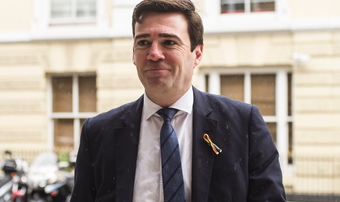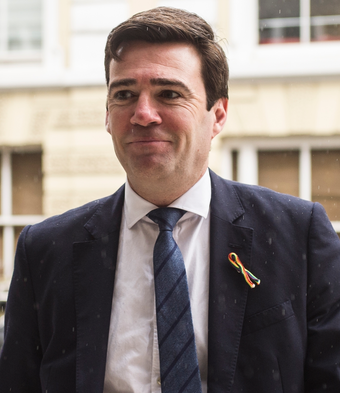The new thought police?

In this week's long read, we ask what Biblical wisdom can be applied to "hate speech"
Do you ever worry that your social media presence is being watched, monitored and could mean you get arrested? Are you careful about what you are willing to say publicly online for this very reason? What about being arrested for praying silently in your head? Can you even imagine that happening to you? If that sounds very Orwellian, and 1984 to you, then you need to know about two recent cases.
The first involved Isabel Vaughan-Spruce, who has been arrested twice for silent prayer outside abortion facilities. The second and more recent case involves Adam Smith-Connor, a former army veteran and dad who prayed silently in an abortion clinic buffer zone in Bournemouth. He was praying about his dead son, who was aborted 20 years ago. He was approached by community officers and given a fixed penalty notice in December last year.
Initially, Bournemouth, Christchurch and Poole (BCP) Council didn’t pursue prosecution within the statutory time-limit. The police also informed Mr Smith-Connor he was not breaking the law. But then came a U-turn and this week he attended a hearing at Bournemouth Magistrates’ Court. He duly entered a plea of not guilty and will therefore head to court in an attempt to clear his name. Here’s what his legal representative, Jeremiah Igunnubole of ADF UK said. It’s worth quoting in full.
"In permitting the prosecution of silent prayer, we are sailing into dangerous waters regarding human rights protections in the UK. Censorship zones are inherently wrong and engender unhelpful legal confusion regarding the right to free thought. Both domestic and international law have long established freedom of thought as an absolute right that must not ever be interfered with by the state. In various other circumstances, the police and the courts have made it clear that silent prayer is not a criminal act. And yet, BCP Council has introduced a rights-restricting censorship zone, which they now argue extends to a ban on silent prayer. The zone was created by the council, enforced by the council and now also prosecuted by the council. This is a remarkable consolidation of power, making the council the judge, jury, and executioner."
It seems to me that even if you question the wisdom of standing inside a buffer zone – whatever one might think of them as a policy – his trial represents a chilling reflection on the state of free speech and freedom of expression. But there’s also the apparent confusion within the police force. On the one hand, he’s told that he’s not breaking any laws. On the other, community officers approached him and he’s given a penalty notice.
Sadly it’s not been a good week for the police across the UK. The media this week covered stories of seven police officers dragging an autistic girl from her home for an alleged hate crime. What did she do? According to the police, her family called them because she was intoxicated and putting herself at risk in Leeds city centre. Officers drove her home and it was during this drive that she allegedly made the comment about a female officer looking like her lesbian nana. She was then arrested on suspicion of a homophobic public order offence. After being interviewed, she was released on bail.
It’s worth saying that in this story there may be more that’s gone on that we don’t know about. It’s possible the girl said more abusive things to the officers. But notwithstanding this, is it really a good use of police time and capacity to be arresting someone for an insult? It seems the police accept there’s a public perception problem here. Last year, the new chief inspector of the constabulary, Andy Cooke, said ‘we’re not the thought police’. He went on to say the police were not going to spend their time arresting people for having dissenting views.
But the very fact he had to make that statement points to a bigger issue. Between 2014 and 2019, police forces across the UK recorded 120,000 non-crime hate incidents. These are non-criminal actions. But they will still appear in background checks, even if there’s little to no evidence to prove any hate involved. Despite Mr Cooke’s words, police forces have demonstrated a peculiar enthusiasm for targeting opinions and thoughts.
In 2021, Merseyside Police put up a billboard outside an Asda which warned ‘being offensive is an offence’. In 2018, South Yorkshire Police urged people to report ‘offensive or insulting comments’ as part of a ‘Hate Hurts’ campaign. Or what about Humberside businessman, Harry Miller, who had a non-crime hate incident recorded against him after he tweeted about gender ideology. One of his tweets was actually a retweet of a limerick. As a result, a police officer from Humberside Police called him up and told him the police had to ‘check his thinking’. Sounds very 1984 to me!
If you go back to Sir Robert Peel’s policing principles, number two says this: “To recognise always that the power of the police to fulfil their functions and duties is dependent on public approval of their existence, actions and behaviour, and on their ability to secure and maintain public respect.” Judging from the comments and reaction to some of the stories cited above, perhaps police forces are currently living on borrowed public respect. And of course, I imagine for some of us it raises the concern and anxiety that it won’t be long before police officers start checking the sermons we preach or hear in church, to ‘check our thinking’ as well. As our preachers and leaders expound the Christian worldview on sexuality, gender and the exclusivity of Jesus as the only way to be saved, are they in fact putting themselves in the firing line of the thought police?
Having said all this, let me make the case, briefly, in defence of the police. For they deserve some sympathy in all this. After all, their job is to enforce the law. And it’s not police officers who make legislation. Ultimately, that’s down to our elected representatives. It was the House of Commons who in January of this year, passed the first ever thought crime law in England and Wales when they approved new laws providing for buffer zones outside abortion clinics which included the criminalisation of silent prayer. It’s not the police who developed the Public Order Act or the specific guidance on prosecuting hate crime incidents. The real problem goes a lot deeper and touches on a fascinating and vital question. Is the purpose of criminal law to punish wrongdoing or is it to make people better, to make society a better place?
Arguably, hate crime laws are trying to do both. And this is where we run into so many issues. Because how do you legislate against hate? Who decides what constitutes hate and what doesn’t? Can law ever be used to legislate against people’s minds and thoughts? Is that not just a slippery slope? Yet at the same time, laws are more than just legal instruments. They do send social messages. Legislation is both about preventing wrongdoing and punishing offences and it is also about making our society better. You see this pattern in biblical law. As you go through Leviticus especially, you find laws intended to bring criminals to justice. For example, Leviticus 20 verses 1-5 tell us that if any Israelite sacrificed their child to a false god, the death penalty was to be applied.
But you’ll also find laws to do with making society better, and more just and fair. So you also find laws about leaving some of the produce of your field so the poor could take it and survive (Leviticus 19:9-10).You find laws about respecting the stranger and the immigrant and not showing partiality and favouritism to the poor or the rich (Leviticus 19:33-34 and Leviticus 19:15).
What about the Bible and hate crime laws? Is there any guidance? Well, firstly there’s Proverbs 10:19 which says “sin is not ended by multiplying words, but the prudent hold their tongues.” James teaches us that the tongue is a “fire, a world of unrighteousness. The tongue is set among our members, staining the whole body, setting on fire the entire course of life, and set on fire by hell…. It is a restless evil, full of deadly poison.” Just imagine if James took a look at Twitter or other social media channels today! The Christian goal of speech should be to communicate truth and to do so in love. Moreover, Romans 14:15, which says we must be convinced in our own minds, offers a defence of freedom of expression.
But - and this is important - given the doctrine of sin and the need to restrain it, the Bible does not answer the question: how much evil speech should we allow legally? Should we ever legislate about hate speech? Is it actually possible to do so in a credible way? This is a matter of wisdom and prudence. But again, should we expect such qualities from those who’s minds are darkened because they’ve rejected the light of Christ? One writer said this:
“Our post-Christian society has married moral relativism to a sense of righteous zeal inherited from its Christian past, without any of the Christian humility that comes from the comforting faith in God’s providence. Accordingly, it is hellbent on a moral crusade to enthrone relativism by force of will.”
He goes on to argue that to counter this reality, we must maintain both conviction and humility and we should advocate for a culture of persuasion. This would be a world where we accept people think differently about a whole host of things. It also means understanding that law is not the only way to tackle speech we disagree with. It also means calling out wrongful speech, especially within our own churches. We should learn to listen more than speak, disagree well when there’s a genuine difference and also use conversation to discuss and yes, debate ideas with which we differ. And it means boldly maintaining our witness, recognising that there is wisdom in selecting the time and place when we share gospel truths (Ephesians 4:29).






